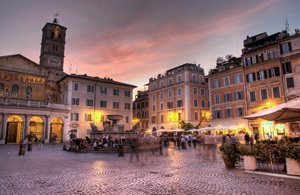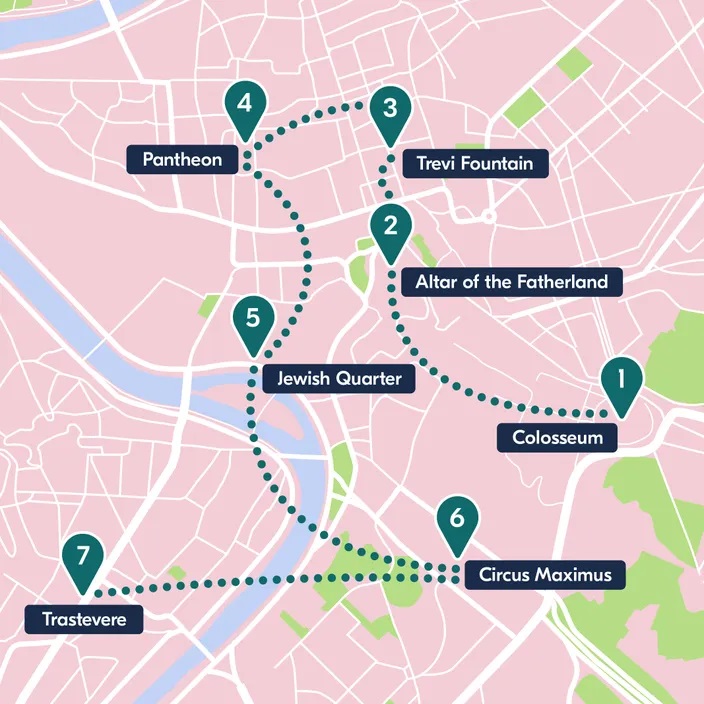Rome, the Eternal City, is the capital of modern-day Italy, as well as a storied hub for ancient architecture, history, art, and food. Follow this guide to help you explore Rome on foot over the course of two days, from St Peter’s Basilica and the Colosseum, to the Tiber and Palatine Hill — with more than a few pasta and shopping stops along the way.
Day 1
Morning
Explore 2,000 years of history at the Vatican Museums (2.5 hours)
Vatican City, encircled by Rome, is the smallest country in the world and home to the Vatican Museums, where more than 20,000 priceless pieces of history and art are on display across 24 interconnecting galleries. Although you can enter the museum for free on certain days, you can’t book ahead and the line will eat into your 48 hours — so book a ticket in advance, and an audio guide at the very least, as its sheer size can be overwhelming and there aren’t many signs. Grab a map at the beginning and make sure you leave time to explore the Sistine Chapel, which sits at the end of this labyrinth of spaces, as well the Salvador Dali painting in The Collection of Modern Religious Art — it’s truly breathtaking.
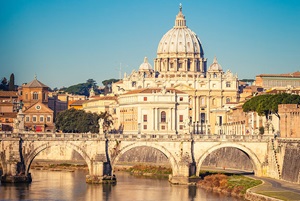
Regardless of your faith, it’s impossible to imagine the beauty of St Peter’s Basilica — one of the Catholic Church’s holiest temples and the burial place of popes and saints — until you see it in the flesh. Entrance is free, and the often long lines are unavoidable but move fast. Booking a guided tour can speed things up and impart a detailed knowledge of the building’s history and the many works of art on display. Make sure you explore the basilica’s underground spaces too, as well as climbing to its dome for unrivaled views of St Peter’s Square and Rome beyond it.
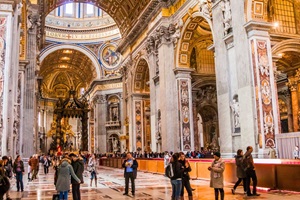
Afternoon
Stop for lunch in Prati (1 hour)
A short walk to the east of the Vatican will bring you to Rome’s Prati neighborhood, a vibrant area filled with cafes, restaurants, and gelato stands where you can enjoy your lunch alfresco if the weather’s on your side. Find a Rosticceria, which is typically a hole-in-the-wall style spot with buffet-style food behind the counter. Expect plates of lasagne, roasted meats and vegetables, and pastas, paid for by weight and often made according to age-old family recipes — it’s one of the most authentic ways to eat in the city. Once you’ve refueled, shop around the area’s tempting boutiques, as you make your way south.
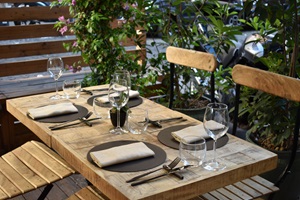
Explore the riverside Castel Sant’Angelo (1 hour)
South of Prati along the Via Virgilio, you’ll reach Piazza Adriana. From here, it’s only a short stroll to the Castel Sant’Angelo — aka Hadrian’s Tomb, which sits on the River Tiber, Rome’s main artery. Completed in 139 CE, it was originally intended as a mausoleum for the Emperor Hadrian, but eventually became a military building. A guided tour is the best way to become fully immersed in the history of this ancient castle, making time to drink in its incredible panoramic views of the city. While you’re there, walk the length of the 2000-year-old St Angelo Bridge — it holds the history of Rome in its sturdy arches and has views over the Vatican, Castel Sant’Angelo, and the Tiber.
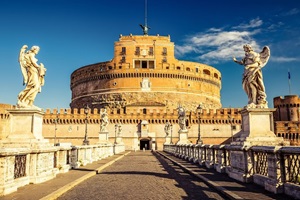
Window shop Italy’s most famous designer stores and climb the Spanish Steps (2 hours)
Wander along Rome’s stylish Via dei Condotti, which is filled with designer boutiques from Gucci to Fendi and before long, you’ll reach the Piazza di Spagna, os Spanish Steps. You’ll find a perfect photo opportunity in front of the Bernini Fountain, as well as standing atop the iconic staircase named after the Spanish Embassy it is built in front of.
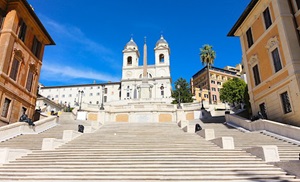
Evening
Find the perfect mix of art and nature in Villa Borghese (2 hours)
Head north to the Piazza del Popolo and the stunning Villa Borghese, one of the largest parks in Rome and a true green idyll in the heart of a bustling city. Art lovers will want to visit the nearby Borghese Gallery with its collection of masterpieces by artists such as Caravaggio — if you prefer a guided tour, make sure to book in advance as slots tend to fill up quickly. Head to the western edge of the park to watch the sunset from the Terrazza del Pincio, the views are particularly magnificent from its Promenade.
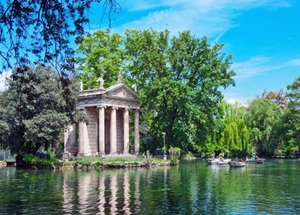
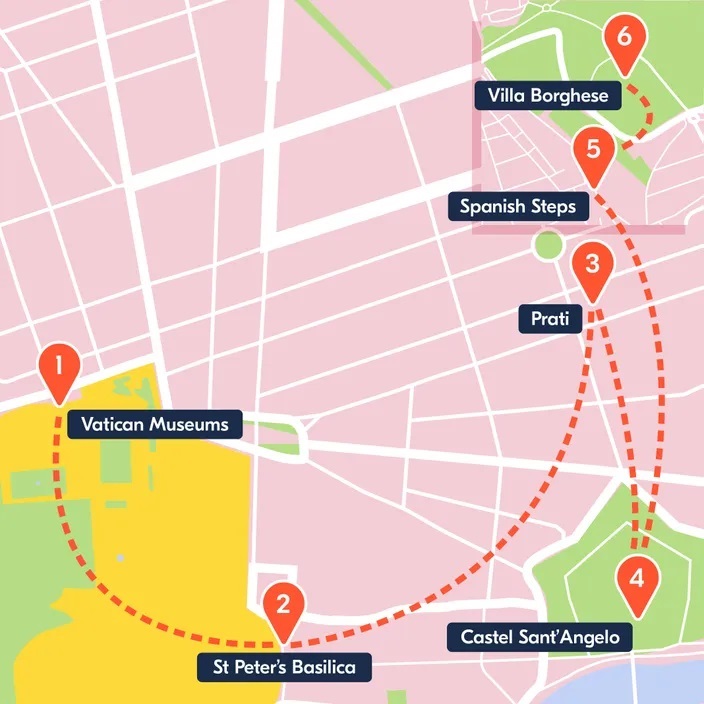
Day 2
Be an early bird at the Colosseum and Roman Forum (3 hours)
Get up early to visit the Colosseum, Rome’s most iconic sight, before the crowds descend. There is so much to experience at this wonder of the ancient world, that it’s best to book a guided tour and let an expert guide you through it and answer any questions you might have. Make sure you choose a ticket that allows you to enter the underground passages, as well as through the Gladiators’ Gate to stand in the Arena floor — it’s pretty special to see from the gladiators’ point of view. From here, it’s only a short walk on to the Roman Forum and Palatine Hill, the birthplace of the city, and access is included in all Colosseum tickets.
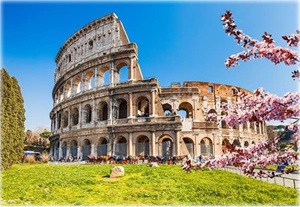
Get a unique panorama of Rome at the Altar of the Fatherland (1 hour)
A bold national monument erected in honor of Victor Emmanuel II, Vittoriano — known as the Altar of the Fatherland — stands elevated in Venice Square and its terraces offer mesmerizing views of the city, including the Colosseum and the Roman Forum. Taking the glass elevator to the top is something of a hidden gem that not many tourists know about, but you can visit the Altar’s terrace for free if you climb the 243 steps instead. A limited number of people are allowed to do this at any one time, so be prepared to wait.
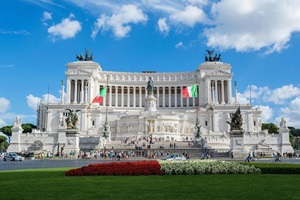
Book your return at the Trevi Fountain (30 mins)
Go down the Via del Corso to make your way to what is arguably the world’s most famous fountain: the Trevi Fountain. Make sure you have a spare coin on you to toss into the water, which ensures you’ll return to Rome one day, according to legend. Did you know that more lies beneath the fountains jets and statues? This tour delves deeper into the myths and legends behind the famed Fontana di Trevi, before visiting the ruins of the ancient aqueduct below.

Find the light at the Pantheon (30 minutes)
The Pantheon is one of the best preserved examples of Roman architecture and has been in constant use since it was built 2,000 years ago as a temple to the gods. Stand beneath its open dome — designed to symbolize the vault of heaven — and bask in the rays of light that pour through the Oculus, a nine-meter diameter hole in the dome’s roof. Entry to the Pantheon is free whenever you visit, but on weekends and public holidays, you need a timed ticket which must be reserved online in advance.
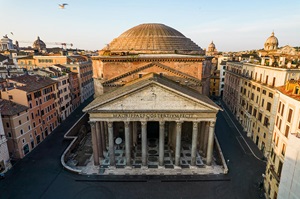
Get a taste of Rome in the Jewish Quarter (1.5 hours)
Rome’s Jewish quarter is the best place in the city to get a taste of the authentic flavors of the city. Enjoy a late lunch feast of Roman dishes with a heavy Jewish influence: deep fried artichokes, fried courgette flowers, and spaghetti with carbonara or cacio e pepe — or, indeed, anything with pecorino cheese. Book onto a guided tour of the Old Ghetto to dig a little deeper into the Jewish influence on Italian dishes. On your way to the Jewish quarter, stop by the ruins of Largo di Torre Argentina, the location of Julius Caesar’s assassination and the site of four former Roman temples that date back thousands of years.
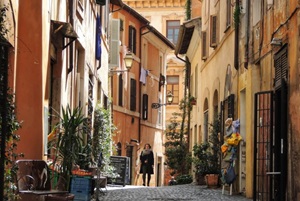
Evening
Walk it off en route to the Circus Maximus (1.5 hours)
Once your appetite is sated, walk off the indulgence on the way to Circus Maximus. Take the southeast route from the Jewish quarter, strolling along Lungotevere dei Pierleoni against the traffic. You’ll pass by Rome’s original city gates, the Foro Boario — the old cattle market and the site of the first gladiatorial contest — and the site of the religious temples of Hercules, Victor, and Portunus. If you pride yourself on honesty, be sure you stick your hand in the Bocca della Verita, aka The Mouth of Truth. Myth has it that liars will have their hand bitten off. Finally, you’ll come to the ancient Circus Maximus, where the Romans once held their chariot races in a stadium that is said to have accommodated up to 250,000 people.
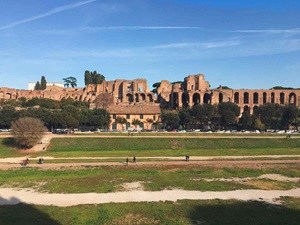
Say arrivederci with dinner in Trastevere (3 hours)
Cross back over the river, stopping to admire the Isola Tiberina — the island of healing — which sits in the middle of the Tiber, and make your way to Trastevere. It’s one of Rome’s most characterful neighborhoods — packed with gelato stands and bars — and is just the place for a few drinks to round off your two days in Rome. Make time after to go inside the Basilica of Our Lady in Trastevere to see the ornate and colorful ancient mosaics, beautifully illuminated by night.
